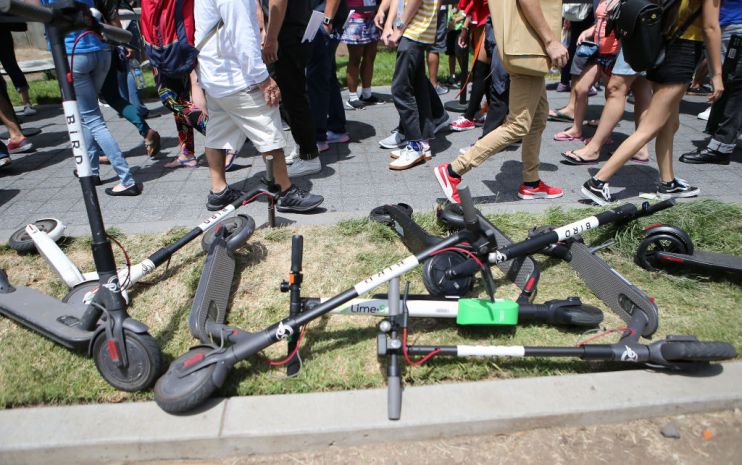E-scooters: Why Bird’s bankruptcy is a turning point for the sector’s profit scrap

E-scooter startups were once some of the most hotly-anticipated businesses in Western markets.
From obscurity just years ago, names including Tier, Lime and Bird are now well known across Europe and America. E-bikes have also exploded in popularity, with the electric bike users now a common sight on the way into work in London.
But has it all been a bit of a sham?
Bird, the e-scooter rental pioneer which is well known for becoming the fastest startup to secure a fabled “unicorn” valuation, filed for bankruptcy last month.
While questions have been raised about the company’s business model following such a turbulent year, financial struggle has become a growing theme in the sector and most of the key players can’t seem to turn a profit.
Berlin-based Tier announced plans to cut nearly a quarter of its workforce in November and has undergone several rounds of layoffs over the last few years. It was reported in February the startup had been working with bankers at Rothschild to secure a mammoth fundraising.
Granted, operators can use the pandemic as somewhat of an excuse, with lockdowns prompting a massive reducting in urban footfall.
But the e-mobility market is highly competitive and a challenging macroeconomic backdrop, namely due to high interest rates and borrowing costs, is tightening the noose on an industry whose model was already questionable.
Market ‘out of control’
Costs are soaring, yet operators are obliged to keep the price of renting out their fleets low amid such a fierce battle for customers.
And problems surrounding legislation and safety are cropping up all over the shop. Paris, which is home to Tier, Dott and Lime, banned e-scooters from the capital last year and there is an ongoing and unresolved problem with the batteries used to power micromobility vehicles – which are prone to causing dangerous fires.
In London, anyone who spent a significant chunk of time on the roads over the summer will be all too aware of the distinctive ‘clacking’ noise made by Lime bikes which have been illicitly hijacked. The problem has now been resolved but posed a real headache for the firm and saw many of the electric bikes left broken and discarded near the city centre – not fantastic PR.
Dott has seperately withdrawn it’s e bikes from the capital entirely. Its chief executive told City A.M. in an interview the market had become “out of control,” due largely to the capital’s confusing borough-by-borough contracting system, which has led to issues with parking and how to work out where each operator’s bikes can actually run.
Oliver Montague, co-founder and chief executive of competitor Swytch, which develops electric conversion kits to power normal bicycles, told City A.M. many operators had failed to adjust their business models when expanding into new cities.
“Where many have stumbled is by attempting to reach everywhere simultaneously, overlooking vital local nuances.” These include adjusting language and metrics when advertising e bikes and scooters in new regions, or looking at behavioural disparities to avoid demand becoming outpaced by the rate of damage to the devices.
“If you look at the numerous micro mobility companies that went bankrupt or have been struggling in the UK, a common thread was their outsider status, marked by a failure to fully grasp and cater to local intricacies,” he added.
Despite the trouble at Bird and Tier, financial experts tend to see a future for micromobility providers. John Bringardner, head of Debtwire, a provider of financial data on the fixed income market, said: “What we’re witnessing is not the end of the rental e-scooter business, but its maturation.”
“The early days of growth-at-any-cost are over,” he said, drawing parallels with the ride-hailing market, which has moved on from the early days of being populated by small competitors, and consolidated around US giants Uber and Lyft.
“The early days of growth-at-any-cost are over.”
John Bringardner, Head of Debtwire
Lime, the largest player in the US, reported a massive jump in earnings for the first half of last year. Following the announcement, chief executive Wayne Ting said in an interview with City A.M. that he was watching the IPO market “very, very closely.”
Meanwhile, Swedish startup Voi reported market level positive EBITDA in 2022. The group’s head of public policy in the UK, Ireland and France, Matthew Pencharz, told City A.M. the company was going into 2024 “optimistic,” although he cautioned over missing legislation in the UK and the “onerous fees levied by councils” to operate, which could lead to “lack of investment or unsustainable services.”
Even on Bird, Bringardner said that although early investors had “suffered,” it still has a solid foothold in over 300 markets around the world. “It has done the hard work of establishing the infrastructure needed for a business like this – striking deals with local regulators and city agencies, and building networks of support staff.”
The Miami-based startup could still avoid an Icarus-esque ending to its journey, although the days of its unicorn valuation are undeniably a long way off.
City A.M. approached Lime, Dott and Bird for comment.